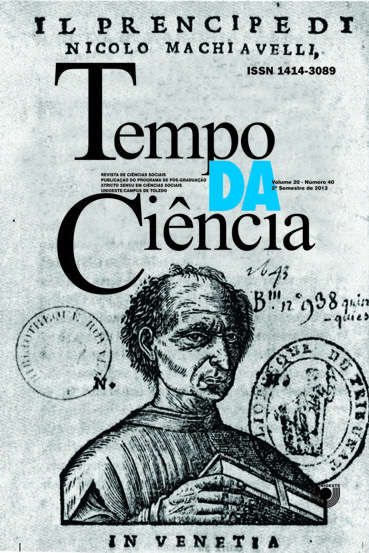Revolução Passiva no Brasil: uma ideia fora do lugar?
DOI:
https://doi.org/10.48075/rtc.v20i40.10053Keywords:
Passive revolution, Gramsci, Brazilian capitalism, C. N. Coutinho, L. W. Vianna.Abstract
This article has as its mains to reflect on the translation of thegramscian category of passive revolution to the analysis of Brazilian state’smodernization, in terms of the polemic on ideas and its place, originatedby Roberto Schwarz in the 1970’s, to understand the exportation of liberalideas to Brazil. In first place, we search in the Prison Notebooks to understandhow the notion of passive revolution was taken by the Italian MarxistAntonio Gramsci to understand the Italian history. With that, we passto the works of Carlos Nelson Coutinho and Luiz Werneck Vianna, scholarsthat have taken the gramscian idea of passive revolution to search explanationsof the development of Brazilian capitalism. Thereby, we seek160ARTIGO Tempo da Ciência Volume 20 Número 40 2º semestre de 2013to, in first place, from Italian history, clarify the idea of “passive revolution”and, in second place, to highlight the specificity of this term whenapply to the Brazilian case, as well as the original aspect of these Brazilianscholar’s analyzes in their intellectual context.Downloads
Published
How to Cite
Issue
Section
License
Aviso de Direito Autoral Creative Commons
Política para Periódicos de Acesso Livre
Autores que publicam nesta revista concordam com os seguintes termos:
1. Autores mantém os direitos autorais e concedem à revista o direito de primeira publicação, com o trabalho simultaneamente licenciado sob a Licença Creative Commons Attribution que permite o compartilhamento do trabalho com reconhecimento da autoria e publicação inicial nesta revista.
2. Autores têm autorização para assumir contratos adicionais separadamente, para distribuição não-exclusiva da versão do trabalho publicada nesta revista (ex.: publicar em repositório institucional ou como capítulo de livro), com reconhecimento de autoria e publicação inicial nesta revista.
3. Autores têm permissão e são estimulados a publicar e distribuir seu trabalho online (ex.: em repositórios institucionais ou na sua página pessoal) a qualquer ponto antes ou durante o processo editorial, já que isso pode gerar alterações produtivas, bem como aumentar o impacto e a citação do trabalho publicado (Veja O Efeito do Acesso Livre).
Licença Creative Commons
Esta obra está licenciada com uma Licença Creative Commons Atribuição-NãoComercial-CompartilhaIgual 4.0 Internacional, o que permite compartilhar, copiar, distribuir, exibir, reproduzir, a totalidade ou partes desde que não tenha objetivo comercial e sejam citados os autores e a fonte.


